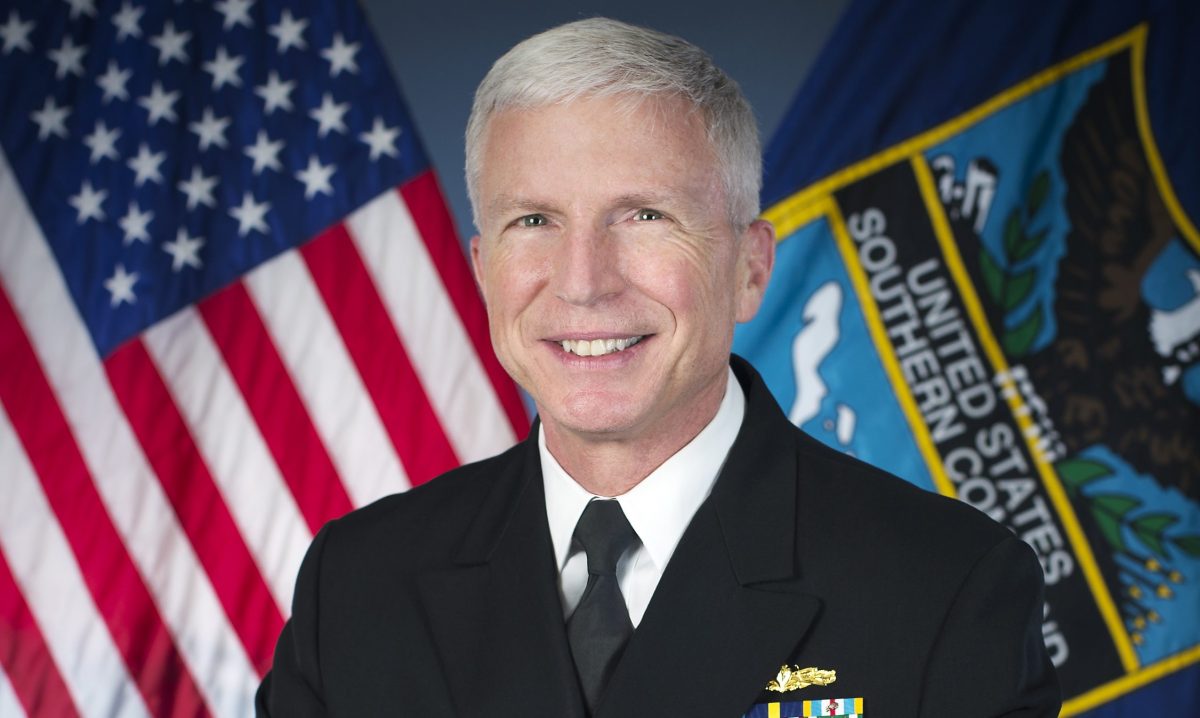US admiral: We’re not militarising the Caribbean

(Trinidad Guardian) The United States says it is not militarising the Caribbean but will remain transparent in all of its operations as it mounts a united effort to dismantle the transnational narcotics trade.
Speaking in a telephonic press conference from the United States yesterday, Commander Admiral Craig Faller spoke about the US enhanced counter-narcotics operations led by the US Southern Command which has executed several major drug busts in the Caribbean Basin.
Defending their expanded military presence of the coast of Venezuela, Commander Admiral Craig Faller called on democratic countries to engage in sharing intelligence saying this was the only way to stop cartels from creating instability in the region.
He accused Venezuelan president Nicolas Maduro of benefitting from the illicit drug trade which has killed 70,000 people annually in the United States.
“The transnational criminal organisations deal in drugs, weapons, trafficking in illicit people. It’s a 90 billion dollar per year illicit organisation and they seek to undermine these democracies and partner institutions for their own benefit,” Faller said.
He added, “Maduro and his cronies have been profiting enormously from illicit trade. We have seen a 50 per cent increase in drug trafficking in and out of Venezuela in recent years. That makes the narco-traffickers who work in and out of Venezuela a target.”
However, Faller said the increased dismantling of the narco-trade was not geared at Maduro.
“This operation is not geared at Maduro but destabilising effects of transnational criminal organisations. Another part of the vicious circle that affect stability in the western hemisphere is external State actors- blind actors like Cuba, Venezuela, Nicaragua, Iran and others.”
He said these external state actors that do not have democratic values and they thrive on the instability created by transnational criminal organisations.
“Recently based on recognition of the threat, the President (Donald Trump) approved a level of forces for this mission. We have enhanced levels with additional ships, both the United States Navy and the Coast Guard, helicopters, patrol aircraft, other intelligence assets and some planned forces to work with our partners,” Faller said.
He added, “We intend to work in all domains—on sea, land, space, cyber, air and information because the transnational criminal organisations and the narco-terrorists operate in all domains as well. We will work closely with our interagency partners in the United States as well as partners in Latin America and the Caribbean.
“The enhanced security is not to militarise the Caribbean. Enhanced security saves lives,” he said.
He noted that the volume of illicit drug trafficking out of Venezuela has significantly increased in the last few years. During a recent joint operation by the US, Netherlands and Columbia, Faller said 5.4 metric tonnes of narcotics were seized.
“We will look for ways to put pressure on those networks and take financing out of the pockets of Maduro. The abject suffering that Maduro has put on the people is known and they cannot get a legitimate democracy for the people,” he said.
Responding to a question about the Cuban affiliation with Venezuela, Faller said, “The connection between the illegitimate Maduro and Cuba is thick and strong, Maduro owes his position in power by the Cuban influence.”
He added, “We will share intelligence and this is where our partners come into play. We will share information with trusted partners with our inter-Agency partners and that is important in going forward as we try to get a better understanding of how to disrupt and dismantle them.
“We want to put pressure on these criminal organisations and take illicit financing out of the pocket of Maduro and the cartels and deny them the ability to destabilise governments, the region and kill people in the States and in the region.”
Asked whether the US was satisfied with the level of support received by Caricom, Faller said the US has engaged in security conferences and intelligence gathering through Memorandum of Understanding.
Asked whether the increased military presence near Venezuela’s borders will have an impact of T&T’s stability, Faller said the US will be open with its operations.
“We have a strong relationship with T&T and the Defence Force. My first visit as a commander of US was in T&T where the chief of defence at the time hosted Caribbean security conference and we talked about the threat of transnational criminal organisations,” he said.
He added, “This operation is enhanced to indicate that when we conduct counter-narcotics operations to defeat criminal organisations and we need to do it more effectively and the key to that is working with T&T. We have our Organisation Interagency Task Force where we share intelligence. Finding the right level of forces and intelligence gathering and the right combination of assets in order to make a difference for all of us.”
Faller said he could not disclose how many military ships were positioned in the Caribbean Basin nor would he say where they were positioned.
“We have been and will continue to be very transparent with our key partners about what our intentions are and what our forces will be. We are all in this together as well fight back the scourge of transnational criminal organisations,” he added.
He also said that Iran was the largest state sponsor of terrorism worldwide and the US was monitoring Iranian activities. He did not comment specifically about ongoing illicit activities that were under the US radar but he said the US was willing to share intelligence and work with all democratic nations to get rid of drug cartels in the Caribbean and Pacific.
